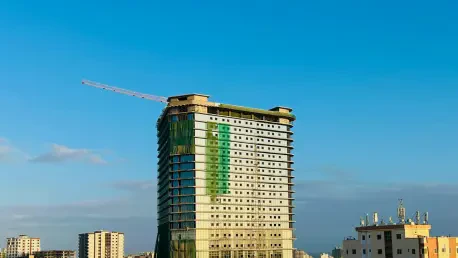Africa stands at a critical juncture where the potential for transformative growth is immense, yet it is hindered by a staggering $70 billion annual infrastructure deficit that affects millions of lives across the continent, translating into real challenges. About 600 million people lack access to electricity, reliable transportation remains elusive for many, and digital connectivity is still a distant dream in numerous regions. The PMI Global Summit Series Africa, held in Kigali, Rwanda, convened nearly 1,000 delegates to confront this pressing issue head-on, delivering a resounding message: the barrier to progress is not a shortage of capital but a critical lack of well-prepared, bankable projects. The urgency to address this shortfall was palpable, as discussions illuminated a pathway forward through strategic planning and execution. Kigali, a city symbolizing rapid development, set the stage for a dialogue that blended optimism with actionable insights, aiming to unlock the continent’s vast potential through focused, investable initiatives.
Defining the Core of Bankable Initiatives
The concept of bankable projects took center stage at the summit as the linchpin for addressing Africa’s infrastructure challenges, with clear criteria outlined by experts from the African Development Bank (AfDB). Armand Nzeyimana, a key figure from the bank, emphasized that such projects must demonstrate technical feasibility through robust designs and resilient standards, ensuring they can withstand real-world demands. Additionally, financial viability is crucial, requiring transparent revenue models and risk-return profiles that appeal to investors seeking sustainable returns. Robust risk management, tackling issues like currency fluctuations and political instability, completes the triad of requirements. Without meeting these benchmarks, even the most visionary plans struggle to attract funding, leaving critical infrastructure needs unmet. The summit positioned these criteria as non-negotiable for transforming ideas into tangible assets that can drive economic and social progress across African nations.
Beyond defining what makes a project bankable, the discussions highlighted the pivotal role of project management in turning these standards into reality. The lack of well-prepared initiatives often results in significant delays, with timelines stretching far beyond initial projections and inflating costs. This inefficiency stalls progress on essential services, from power grids to transport networks, directly impacting millions who await these improvements. By embedding global project management standards, as advocated at the summit, African nations can build the capacity to design and execute initiatives that meet investor expectations. This approach not only secures financing but also ensures that projects deliver on their promises, paving the way for sustainable development. The emphasis on preparation and execution underscored a broader need for systemic change in how infrastructure projects are conceptualized and implemented across the continent.
Tapping into Africa’s Vast Opportunities
Africa’s potential to shape global prosperity is undeniable, as spotlighted by Dr. Akinwumi Adesina, former President of the AfDB, during the summit deliberations. The continent holds 65% of the world’s uncultivated arable land, positioning it as a future breadbasket for a growing global population. Coupled with vast reserves of critical minerals essential for the green energy transition, and a demographic advantage where a significant portion of the world’s youth resides, Africa is brimming with economic promise. Furthermore, 13 of the world’s fastest-growing economies are African, signaling a dynamic market for investment and innovation. However, this potential remains largely untapped due to persistent infrastructure deficits that prevent the continent from fully capitalizing on these strengths, leaving vast opportunities unrealized and communities underserved by basic amenities.
Despite these advantages, the $70 billion annual infrastructure gap casts a long shadow over Africa’s growth trajectory, creating systemic barriers that hinder progress. The summit revealed that this deficit is not merely a financial issue but a developmental one, as it delays access to critical services like electricity for hundreds of millions of people. Poorly planned projects exacerbate the problem, often taking 50% longer than anticipated, stretching from five to eight years or more, and incurring substantial cost overruns. These delays have a profound human cost, stalling advancements toward the Sustainable Development Goals (SDGs) and perpetuating cycles of poverty and exclusion. Addressing this gap requires a shift in focus from merely identifying needs to crafting initiatives that are structured to attract investment, ensuring that the continent’s resources and demographic strengths translate into real-world impact for its people.
Transforming Through Project Management Excellence
Elevating project management to a strategic discipline emerged as a game-changing theme at the Kigali summit, with a clear call to prioritize impact over procedural milestones. George Asamani, Managing Director of PMI Sub-Saharan Africa, underscored that the true measure of a project’s success lies in its ability to transform lives, echoing a poignant story from a Kenyan beneficiary who said, “We once were in darkness. Now we have light.” This human-centered perspective shifts the focus from mere timelines and budgets to outcomes that address real community needs. By integrating PMI’s global standards and certifications, African projects in sectors like renewable energy, urban development, and digital infrastructure can achieve higher efficiency and reliability, ensuring they deliver meaningful change to those who need it most across the continent.
The summit also emphasized the necessity of building local capacity through training and adoption of proven methodologies to enhance project execution. Many African initiatives falter due to inadequate preparation, leading to investor skepticism and stalled progress. Strengthening project management skills can bridge this gap, equipping professionals with the tools to navigate complex challenges, from technical hurdles to financial structuring. This capacity-building effort is not just about completing projects but about creating a sustainable ecosystem where future initiatives are designed with precision and foresight. The discussions in Kigali highlighted that such an approach could significantly reduce delays and cost overruns, making projects more attractive to financiers and accelerating the pace of infrastructure development across diverse African landscapes.
Learning from Rwanda’s Model of Leadership
Rwanda’s remarkable transformation provided a powerful backdrop to the summit, illustrating the impact of purposeful leadership in overcoming systemic challenges. Kigali, the host city, was frequently cited by speakers like Dr. Adesina as a testament to what can be achieved when vision aligns with disciplined execution. The city’s rapid advancements in infrastructure, tourism, sports, and innovation reflect a deliberate strategy that prioritizes planning and delivery. This model resonates with the summit’s theme, “Africa On Purpose,” inspiring delegates to envision similar progress in their own regions. Rwanda’s journey from post-conflict recovery to a hub of development demonstrates that strategic governance can turn ambitious goals into concrete achievements, offering a blueprint for other African nations grappling with infrastructure deficits.
The lessons from Rwanda extend beyond mere inspiration, providing actionable insights into how leadership can drive infrastructure success across the continent. The country’s focus on meticulous project preparation and execution has attracted investment and fostered sustainable growth, creating environments where communities thrive. This disciplined approach ensures that initiatives are not only completed but also deliver lasting benefits, from improved access to services to economic opportunities. The summit discussions underscored that replicating such leadership requires a commitment to aligning national priorities with global best practices, ensuring that projects are both bankable and impactful. Rwanda’s story serves as a catalyst for broader change, urging African leaders to adopt similar rigor in planning and implementation to address the $70 billion gap effectively.
Building Bridges Through Strategic Alliances
Strategic partnerships were identified as a cornerstone for scaling impact and addressing Africa’s infrastructure challenges during the summit. Dr. Adesina proposed a deepened collaboration between PMI and the AfDB, combining PMI’s expertise in project management methodologies with the bank’s extensive experience in cross-border and high-impact initiatives. This alliance aims to not only enhance project delivery but also nurture a new generation of African project professionals equipped to handle complex challenges. The AfDB’s High 5 priorities—lighting up and powering Africa, feeding Africa, industrializing, integrating, and improving quality of life—provide a structured framework for such efforts, having already touched over 565 million lives through projects like expanded electricity grids and transport corridors.
These partnerships are crucial for creating an environment where bankable projects can thrive, attracting the necessary investment to close the infrastructure gap. By fostering collaboration between international expertise and local knowledge, such alliances mitigate risks that often deter financiers, from political uncertainties to market volatility. The summit highlighted that joint efforts can streamline project preparation, ensuring they meet the stringent criteria required for funding. Additionally, these collaborations build trust among stakeholders, demonstrating a commitment to transparency and accountability. As African nations look to scale initiatives in critical sectors, the synergy between organizations like PMI and AfDB can provide the momentum needed to transform plans into infrastructure that uplifts entire communities and drives economic growth.
Focusing on Execution for Lasting Impact
A significant shift in perspective emerged at the summit, moving the focus from resource constraints to execution challenges as the primary barrier to Africa’s infrastructure progress. Delegates reached a consensus that the continent’s future will be shaped not just by its natural wealth or demographic advantages, but by its ability to implement projects with precision and purpose. This execution-based approach prioritizes addressing real community needs over political or symbolic gestures, ensuring that infrastructure serves as a foundation for sustainable growth. The $70 billion gap, while daunting, can be transformed into a bridge for prosperity by emphasizing quality preparation and delivery, a theme that resonated strongly throughout the discussions in Kigali.
This focus on impact-driven development aligns with a broader movement toward inclusive and sustainable progress across Africa. Building capacity in project management was seen as essential to overcoming the shortage of bankable initiatives, equipping local teams with the skills to design projects that attract global investment. The summit also recognized the value of African-led solutions, drawing inspiration from success stories like Rwanda to craft strategies tailored to the continent’s unique challenges. By prioritizing execution and community impact, African nations can ensure that infrastructure projects translate into improved quality of life, from access to basic services to economic empowerment. This shift in mindset, championed at the summit, sets the stage for a future where the continent’s potential is fully realized through actionable, well-managed initiatives.
Charting the Path Forward with Actionable Solutions
Reflecting on the PMI Global Summit Series Africa held in Kigali, it became evident that tackling the $70 billion infrastructure gap demanded a unified commitment to bankable projects as the foundation for progress. The event brought to light a shared understanding that Africa’s transformation rested on meticulous preparation and execution, supported by robust project management practices. Strategic partnerships, particularly between entities like PMI and the AfDB, were celebrated as vital mechanisms for scaling impact and building local expertise. Looking ahead, the path involves integrating global standards into local frameworks, ensuring that projects not only secure funding but also deliver tangible benefits to communities. The momentum from Kigali must now translate into concrete steps—training programs for professionals, policy reforms to streamline project approvals, and sustained collaboration to attract investment. These actions promise to turn Africa’s infrastructure challenges into opportunities for sustainable growth and global leadership.









